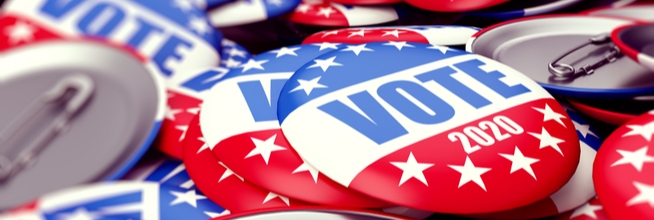2020 Presidential Candidates Get an “F” on Digital Standards
— September 10, 2019

During the 2016 presidential campaign, Donald Trump made headlines when he embarrassed Jeb Bush by purchasing the domain www.jebbush.com and redirecting traffic to his own website.
Not buying www.jebbush.com was an embarrassing oversight, but it was a very small “oops” in the grand scheme of things. Since then, the sirens and flashing lights of the digital world have been getting louder, as awareness of digital risks grows.
Governments and private-sector companies across the globe have been quick to respond with standards and legislation, but our 2020 candidates, including our current president, seem oblivious. And their lack of concern affects every American.
Putting digital risks in context
While data breaches make headlines, they’re just the tip of the iceberg. But it’s easy to understand how they affect our daily lives, so let’s use them for context before we move on to an examination of digital standards in campaign websites.
These are just a few of the biggest data breaches that occurred over the last few years and the number of people affected:
- Facebook/Cambridge Analytica: 87 million
- T-Mobile: 2 million
- Sacramento Bee: 19.5 million
- Panera Bread: 37 million
- Target: 41 million
- Google+: 52.5 million
- Quora: 100 million
In case you don’t have your calculator handy, that’s 339,000,000 people — roughly 10 times the population of California.
Now…the rest of the story
Data breaches are only one small part of the digital pie. Other areas of concern include things like privacy, accessibility, intellectual property, multilingual support, and even email security. But our 2020 candidates don’t seem to be paying attention.
How their websites stack up
When I examined the websites of 2020 candidates, here’s what I found.
- Most of the candidates’ websites aren’t copyrighted. That means other candidates, average citizens, or even the Russians could steal their position papers, circulate altered versions of them, and the candidate would have no legal recourse.
- While the rest of the world is embracing privacy as a human right, many candidates’ sites don’t even have a privacy statement disclosing what information they collect and what they do with it. Of those that do, the readability of those statements according to the Flesch-Kincaid readability test is well above the recommended seventh-grade reading level. That means that the privacy statements are more complex than the average user can understand, something that violates the core principle of privacy statements. Even though the U.S. has been slow to formalize privacy requirements into law, one would expect presidential candidates to see the way the wind is blowing and jump on board.
- While all of the candidates’ websites use cookies to some degree, none of them comply with widely accepted standards on giving consumers a choice. While Elizabeth Warren’s site does let users opt-out, the fact that it’s set to “opt-in” by default falls short of these standards and would even be a legal violation in some countries.
- Only Elizabeth Warren’s site contains an accessibility statement, expressing her intent to make the site accessible to all Americans (note that this is not a claim to have actually done so). Since courts have ruled that the Americans with Disabilities Act applies to digital spaces as well as to physical ones, this should be a top legal concern for anyone running for president.
- For those whose websites contain Spanish content, most are doing a very poor job. Politico stated that they seem to be using Google Translate, “a trick used by high school students to avoid doing their Spanish homework.” Such superficial attempts are likely to turn off the very voters they’re trying to court.
The real marketing opportunity
This is not a small thing. It’s like discovering that your child’s high school English teacher doesn’t know the difference between there, their, and they’re. Or that the person who’s supposed to answer that 3 a.m. phone call lets it go to voicemail.
We have to demand more of our leaders, and that starts with demanding more of our candidates. Their websites are about a decade behind basic digital security and privacy standards. And for the ones who wake up to the value of online integrity soon, there is a real marketing opportunity. After all, if a candidate can’t get their website right, how can we trust them with anything more than that?
Originally published here.
Digital & Social Articles on Business 2 Community
(23)


